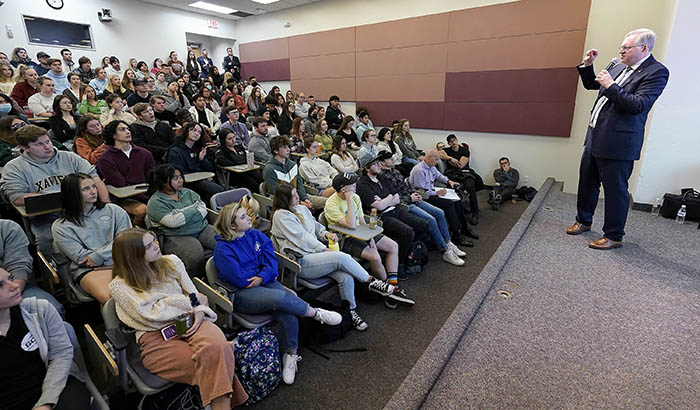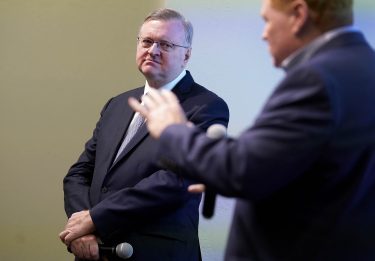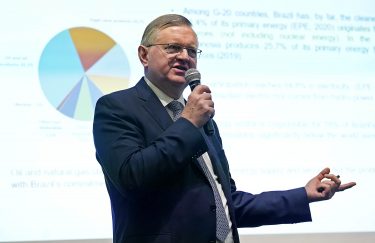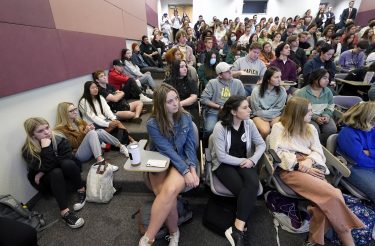
Story by Mike Kilen
Photos by Ralph Freso
GCU News Bureau
Nestor Forster Jr. touted Brazil’s environmental record and response to the pandemic during remarks to standing-room-only crowd of Grand Canyon University students and faculty on Wednesday in Howerton Hall.
In a lecture and question-and-answer session with students, the Ambassador of Brazil to the U.S. said the relationship between “the two largest economies and two largest democracies in the Americas” is strong while standing for freedom of opportunity, rule of law and human rights.
“We have this unique bond with the United States,” he said.
The U.S. is Brazil’s second-largest trading partner ($77 billion in 2020) and export market, with products such as crude oil, aircraft, iron and steel and machinery.

He traveled to Arizona for the first time to strengthen the $1.1 billion in trade with Brazil, especially in agriculture, he said in an interview after his remarks. His stop at GCU was part of the College of Humanities and Social Sciences' ongoing series of lectures from ambassadors that picked up again after a pandemic delay.
“This is a tremendous value. I’d say 99% of students have never met an ambassador,” said CHSS Dean Dr. Sherman Elliott. “To bring them here is a gift to them, bringing ambassadors here to represent their country and get a different view of the U.S.”
Much of the session zeroed in on environmental questions because deforestation is often a hot topic regarding Brazil.
“We are very proud of what we have done in agriculture, feeding 12 billion in the world and doing that in a sustainable way,” Forster said afterward. “We have to dispel the myths and misrepresentations that are in the press every day.”
Forster said student questions were “vibrant, interested and not in your face for show to colleagues. They seemed very interested in the answers, and I’ve done this a couple times. When I told them two-thirds of our land is preserved? We thought you were the tree slashers of the world. We were discussing facts, not propaganda.”
Forty years ago, Brazil couldn’t feed its own people, he said during his presentation. Now, in addition to providing food for people around the globe, it is the largest exporter of beef even though land use devoted to livestock has decreased by 15%.
He credits a science-based agricultural system that increased efficiencies by adapting its products to the climate while preserving the environment. Only 7.6% of Brazil’s land is used for agriculture compared to 18% in the U.S., which helps reduce environmental impact, he said.
Also, nearly half of the energy consumed in Brazil comes from renewable resources, primarily hydropower for electricity and biofuels such as ethanol from cane sugar, which contributes nearly 70% fewer greenhouse gases than fossil fuels to the environment.
“Brazil is today in 2022 where many advanced countries have pledged to be in 15 or 20 years,” he said. “I find that incredible.”
He said his country is often criticized for deforestation, but 84% of the Amazon forest is protected. That area supports the largest biodiversity on the planet with 700 new animal species discovered each year, he said.

Landowners can only use a percentage of their land for production.
“We have in Brazil thousands of private citizens and companies playing a private role in preserving the environment,” he said.
However, Brazil’s National Institute for Space Research reported that 8,224 square miles of the Amazon forest was lost between August 2020 and July 2021, the greatest loss since 2006.
Students’ questions raised concerns about illegal deforestation. Forster said the country has doubled its budget for enforcement but remains committed to helping the people who live on the land, too.
“In the Amazon, 20 million people live there. It’s an Amazon paradox, sitting on the wealthiest region of Brazil, that is in the forest, and they aren’t allowed to use it,” he said of his government’s effort to address the problem with sustainable development.
“Some people want to turn it into a theme park without thinking of the indigenous people who live there. That is the challenge.”
Forster is an appointee of President Jair Bolsonaro, who is facing a challenge in an upcoming election from a liberal party that claims he hasn’t done enough for the poor.
“That is what the leftists say,” Forster said afterward. “They preach that they are the candidates for the poor, but they stole and broke the country 10 times and did nothing for the poor. It’s a matter of record, not a matter of words.”

It drove to the heart of his presentation, which made the case for a strong economy in Brazil. The country weathered the pandemic with direct cash payments to the country’s poor.
If you want to help the poor, give them money, he said. “The alternative is a huge government bureaucracy that consumes a huge part of those resources. It is much more efficient to hand it out straight to the people.”
Brazil has the second-highest number of COVID-related deaths, behind the U.S., but never imposed a lockdown.
Bolsonaro recognized that “not everyone in Brazil had the luxury of staying home with their laptops, sometimes in their pajamas, while still getting their paycheck at the end of the month,” Forster said. “Many people in Brazil have to wake up and go win their bread every day. He was much criticized for that. But Brazil has vaccinated fully 72% of our population, which is 10 full points more than here in the United States.”
Although its president isn’t vaccinated, he said Brazil has a “culture of vaccination” that ranks fourth in the world in percentage of those vaccinated. “People want to take the jab.”
He said regulatory reform and a market-oriented government that eases doing business in Brazil also has helped economic growth. Foreign investment has increased, and more than eight million jobs were created last year in Brazil, he said.
Yet when a student asked about the biggest social challenge facing the county, Forster said it’s including more of its population in that growth.
“How do you do that? Open up the economy,” he said. “There is inefficiency when the state is involved. I’m not saying we don’t need regulation. We do. But we need to streamline those that are causing inefficiency.”
Grand Canyon University senior writer Mike Kilen can be reached at [email protected] or at 602-639-6764.
***
Related content:
GCU Today: Film star has acted to keep the faith in her industry



































































